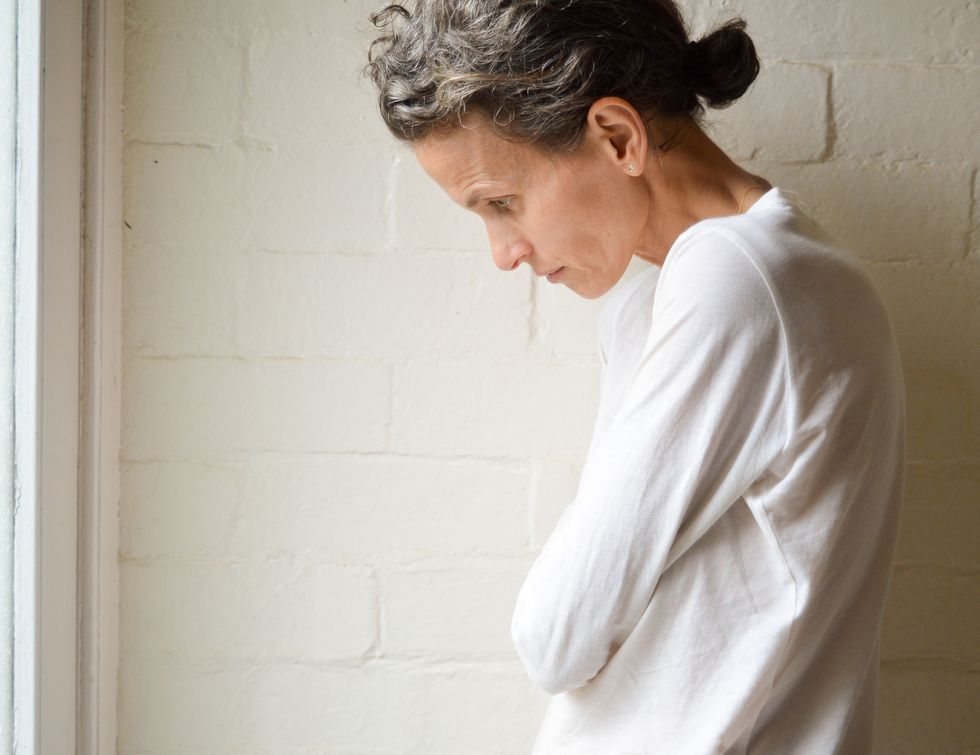Research finds that eating disorders peak during "critical or sensitive" periods of reproductive hormone change, such as puberty. And since menopause is sort of like puberty-in-reverse, changes in estrogen can make women more vulnerable to eating disorders during menopause, too. Both eating disorders and dissatisfaction with body image are on the rise among midlife women, experts say.
What are eating disorders all about, anyway?
An estimated 20 million women in America will have an eating disorder—set off by a preoccupation with body weight, food and their shape—at one point in their lives.
It's not as simple as not wanting to eat: The causes of eating disorders are complicated and interwoven, encompassing biological, psychological and sociocultural dynamics.
For many people, an eating disorder is a way to gain control when things are out of control. Eating-disorder-think: I can't control all my anxiety and stress, but I can control my body.
But eating disorders are not reserved for adolescents. While the behaviors and symptoms of eating disorders may be similar across the board—restricted eating, bingeing and purging—the context can be very different for women in midlife, says the National Eating Disorders Association.
How so?
You could be someone who has struggled all your life with an eating disorder and still, in midlife, the struggle continues.
You may have recovered from a prior eating disorder but have relapsed.
You may have had issues with your weight and food for many years, but it's getting much worse now.
You may be more aware than ever of our youth-obsessed society, struggling with getting older and trying to hold onto an unrealistic version of yourself.
Remind me why this is happening to women around the time of menopause?
Some researchers think that eating disorders can be triggered by hypersensitivity to the fluctuations of estrogen. This, combined with social pressures, can create a "perfect storm," for an eating disorder to develop, they say.
Social pressures?
Let's just say you're a woman around menopause. You probably already know that those years are rife with things and events that can trigger anxiety and stress, such as:
Divorce
The natural aging process and the relentless pursuit of youth
Death of a friend or spouse
Children moving out (or moving back in)
Aging parents
Children getting married
Becoming a grandparent
So, eating disorders basically result in the same behavior no matter what your age—like eating very little, eating too much and then purging. Tell me what else is different for midlife women—what they have to deal with (beyond the obvious).
Well, for one, many women may feel embarrassed or ashamed that they're dealing with a "teenager's issue." They may think they should know well enough to get past that, or they should just "get over it."
As a result, they may resist seeking treatment. And it's possible that their growing list of responsibilities in life makes it difficult to take the time to seek treatment.
When you think about it, in midlife, women have multiple stressors, fears and losses—not just one or two that a teenager might have. Those stressors are usually much bigger, more serious issues (see above) than what a teenager might be dealing with.
I know eating disorders have serious health consequences.
Yep. Big ones: They're potentially life-threatening, affecting both emotional and physical health. Eating disorders can affect the cardiovascular, gastrointestinal, neurological and endocrine systems in your body. Meaning, they can put you at risk for things like heart attacks, bacterial infections, pancreatitis, malnutrition and more, and they wreak havoc with your concentration, sleep, thyroid hormones and metabolic rate.
That all sounds very serious. What kinds of age-related complications do women in midlife have to worry about?
The older we get, the tougher it is for our bodies to bounce back from the stress that an eating disorder puts on it. As we age, our bodies have a harder time fighting disease and other physical assaults, and an eating disorder is, after all, an assault on the body.
And the longer an eating disorder goes on, the worse the cardiac, bone, dental and other effects it has on your body.
Anything else?
Yes. There are some things women are already dealing with during menopause that an eating disorder can make even worse.
Restricting calories and fat can make your skin even drier and your hair more brittle and more likely to fall out.
It can increase your already-higher risk of bone loss.
It may reduce your resting metabolic rate.
It can potentially increase insulin resistance, leading to type 2 diabetes.
It may cause elevated cholesterol levels.
Malnutrition and inadequate nutrition can cause changes in certain types of blood cells and lead to anemia, as well as diminish the ability to fight infection.
Speaking of eating disorders and menopause, there might be some advantages in dealing with eating disorders around midlife—at least emotionally and psychologically, no?
If what you mean to say is that having more life experiences and insights to draw on may help with the treatment, experts do bring this up. That is, the older we get, the wiser we are, and it's more likely we'll be aware of the harmful effects of this type of behavior. And this growing awareness, experts say, has led to more treatment options.







